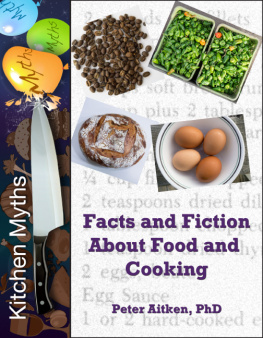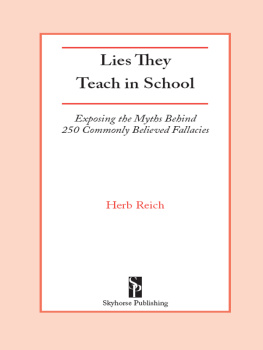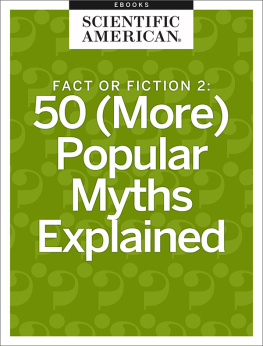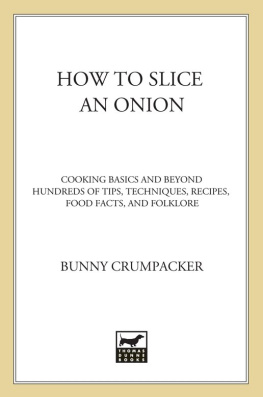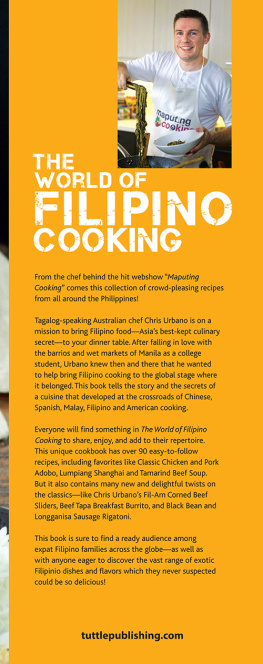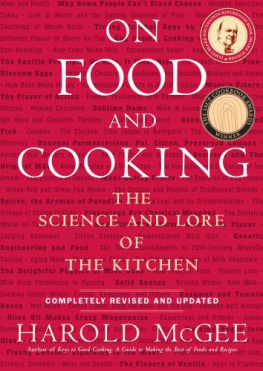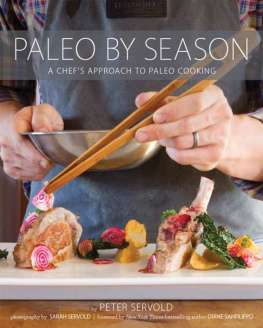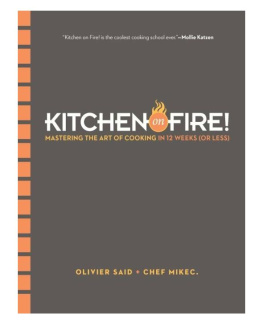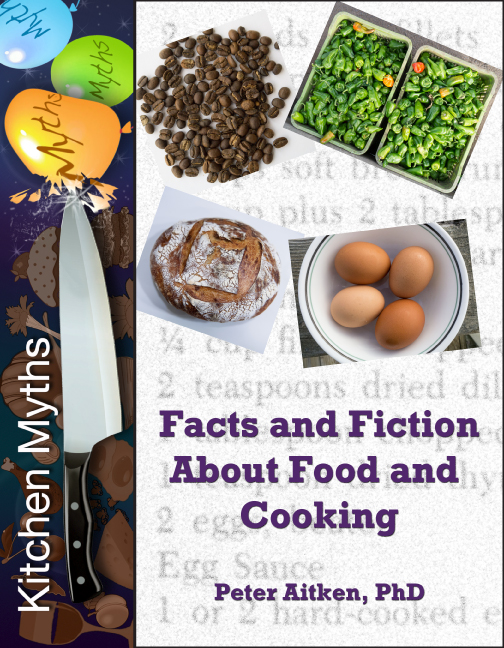
Kitchen Myths: Facts and Fiction about Food and Cooking
Peter Aitken, PhD
Table of Contents
.
Introduction
Weve all heard of urban legends, those plausible-sounding but false stories that circulate so widely on email and blogs, such as the old lady who microwaved her cat or the Nieman Marcus $250 cookie recipe. There are several web sites, such as Snopes, devoted to researching and exposing these fake storiesand verifying those that are true. The same sort of thing happens in the world of food and cooking, and this book is my answerkitchen legends, if you will. I call them kitchen myths.
So, who am I and why did I write this book? I am a retired medical school professor with a long-standing interest in food and cooking. It was natural, I guess, for my scientific mindset to carry over into my cooking. Over the years I kept noticing that certain accepted truths about food and cooking just didnt seem right. For example, I had always soaked dry beans overnight before cooking them, but one day I forgot. In a rush the next morning, I just put the unsoaked beans on the stove to simmer. They took a bit longer, but they came out just fine. The need to soak dry beans, in other words, was a kitchen myth . Over the past few years I collected some of these myths on my blog at www.kitchen-myths.com , and now I figure its time for a book!
How do I know these are myths? Why should you believe me over someone who says that something I call a myth is in fact trueparticularly if that person is your mom or some famous TV chef? I cant answer that question for you, but I can say that all of the information in this book has been carefully researched. I do not claim that something is true or false just because I heard it somewhere, because I read it in a cookbook, or because it seems to make sense. I require that something be backed by a credible source (the key word here is credible ) and/or that it be in accord with accepted scientific knowledge. In most cases this is also backed up by my personal experience (although let me emphasize that my personal experience is not, by itself, enough). I certainly do not claim to be infallible, but I do try hard to present accurate, verifiable information. Believe me, I have had severalno, make that manyof my own long-held cooking facts demolished by this research!
Why dont I cite sources with my myth busting? There are several reasons. First, I wanted the book to be casual and readable and not come across like a boring academic paper. Second, I have found that many people will hang onto their old beliefs no matter how much evidence to the contrary is presentedthis is true in all of life, not just cooking, as the evolution and global warming debates illustrate. Evidence, for these people, is a way of supporting what they already believe and not a basis for changing their beliefs. Finally, the Web is full of citations that seem to support pretty much any hair-brained idea, and all too many people cant distinguish a valid source from an invalid one; valid to them means supports my belief. So, no citationsbut here are some of my major sources:
Harold McGees books On Food and Cooking and Keys to Good Cooking .
Alton Browns shows and books. (He is the only TV chef I know who takes a fact-based approach to cooking.)
Mark Bittmans How to Cook Everything .
Peter Barhams The Science of Cooking .
Modernist Cooking , a 5-volume set of cookery books, full of fascinating information, recipes, and photos.
Robert L. Wolkes What Einstein Told His Cook .
Kitchen Mysteries by Herve This.
The Cooks Illustrated magazines and cookbooks.
The Food and Drug Administration.
The Department of Agriculture.
Based on readers responses on my Kitchen Myths blog, I found out how many people really dont like having their long-held beliefs challenged (and this is just cooking, not politics or religion!). I was amazed at how steamed up some people get when I tell them that what they know to be true is in fact a myth! I have been accused of being a shill for the high-fructose corn syrup people and being in the pay of the MSG manufacturers, thats how desperate some people are to hang on to their beliefs. In actuality, I have no connection whatever with the food industry.
Bottom line, if you disagree with something I say, fine, but I am really not interested in hearing about it. You can leave comments on the blog (as long as you follow the civility rules that are posted there). Note, however, that the blog does not present as many myths as youll find in this book.
Happy cooking, happy eating!
Peter Aitken, PhD
Health and Nutrition
A high-protein diet is bad for your kidneys
The rationale behind this myth is that digesting and processing large amounts of protein puts a strain on your kidneys, which are responsible for filtering the blood and removing certain waste products. This myth became more widespread when low-carb diets, which typically involve eating more protein, became popular. The only problem (common to all myths!) was that there was precious little data to support this notion. Several recent studies looked at the question and found that a high-protein diet did not affect kidney function in people with normal kidney function. These studies were published in The International Journal of Sports Nutrition and Exercise Metabolism , The Annals of Internal Medicine , and Nutrition & Metabolism .
Note, however, that one of these studies suggested that in people who already have some degree of kidney insufficiency, a high-protein diet seemed to hasten renal decline. So, if you are considering going low carb, you might want to have a kidney function test first to make sure it is normal.

DAnjou pears
Compared to sugar, high-fructose corn syrup (HFCS) is worse for your health.
Regular table sugar, or sucrose (also called cane sugar) is made of equal parts of two simpler sugars, glucose and fructose. When digested, it immediately breaks down into these two components and thats what your body absorbs: glucose and fructose. HFCS has the exact same constituents in a slightly different proportion: The most common HFCS, used in soft drinks, contains 55% fructose and 45% glucose (hence, high fructose ). So, ingesting HFCS instead of table sugar gives you a wee bit more fructose and a wee bit less glucose. Big whoop. To listen to some people, HFCS is the end of civilization as we know it! Yet, many studies have been conducted comparing HFCS to table sugar, and they have failed to turn up any real difference in their effects on the body, including insulin, triglycerides, blood glucose, or appetite-related hormones.
The HFCS alarmists also overlook two interesting facts:
1. The most common type of HFCS, called HFCS 55 because it contains 55% fructose, is used primarily in soft drinks, and it is supposedly evil because it contains too much fructose. Yet, there is also HFCS 42, used in some beverages, baked goods, and processed foods) which contains 42% fructose and 53% glucosemore glucose than fructose. Somehow they are both equally evil, according to the alarmists, one because it contains too much fructose and the other because it containswhat, too little fructose? Oh please!
2. Honey, beloved of health food fans, contains more fructose, relative to glucose, than the worst HFCS38% fructose and 31% glucose, approximately. I dont recall hearing about any anti-honey campaigns, do you?
This does not mean that HFCS is good for you! It just means that it is no worse than cane sugar. More and more evidence indicates that the problems with sugar are not the type of sugar you eat, but the amount. Overdoing it on organic honey is just as bad as eating too much of any other source of sugar.
Next page
